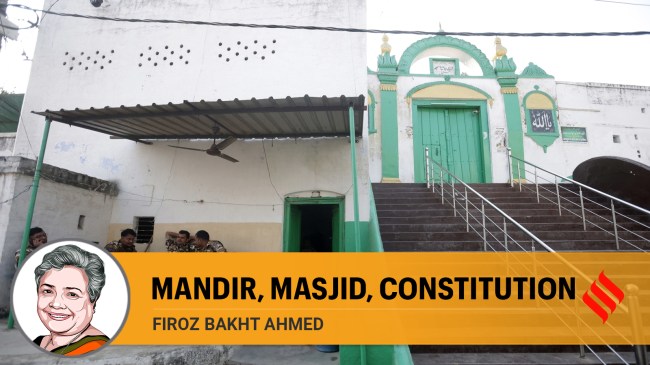Opinion Mandir, masjid, and Constitution: At Sambhal, a promise betrayed
The Sambhal Shahi Masjid controversy is a cleverly engineered conspiracy to keep the Hindu-Muslim pot simmering. The way the petition was filed, and the speed with which the survey was ordered all raise questions about the sanctity of due process.
 Security personnel at Jama Masjid in Sambhal. (Express photo by Gajendra Yadav)
Security personnel at Jama Masjid in Sambhal. (Express photo by Gajendra Yadav) Mandir bhi le lo, masjid bhi le lo/Insaan ke lahoo se magar ab na khelo.
(Take away the mosque, take the temple/But stop shedding human blood.)
— Afzal Manglori
Four Indian citizens have been killed in Sambhal. Their brutal killing has left the Muslim community shaken. Around the same time, news that the Indian Space Research Organisation will launch a European solar mission from Sriharikota was reported. Many will present this as the perpetual paradox that is India. But the contrast does not present a sanguine picture. Progress is predicated on trust between people. While every politician swears by the Constitution and waxes eloquent about it turning 75, there are political elements who seek to damage and destroy that trust and our composite culture. Ironically, we advertise this diversity and culture on every global stage and have cited it in our Olympics hosting bid. But at home, all is forgotten.
Even the sensible comment by RSS chief Mohan Bhagwat, that it will not do to go digging under each mosque looking for a temple, is forgotten. Or, maybe the sarsanghchalak needs to again come out and tell his Parivar that his statement wasn’t an afterthought or an aspiration but an instruction. After all, the RSS, as the Maharashtra election results show, is taken seriously by the BJP.
The Places of Worship (Special Provisions) Act is under challenge in the Supreme Court. As an editorial in this paper flagged, the highest court has called it a cornerstone of our secular principles and at the same time has asked what’s wrong in finding “facts” about a structure. This act of “fact-finding” is itself fraught with peril and often motivated. What stops anyone from going to any court and magistrates ordering “surveys” of mosque after mosque, church after church, gurdwara after gurdwara? Of course, some Islamic rulers destroyed or defiled Hindu temples, they defied the Islamic tenet of “Lakum dinokum waley yadeen” (To you, your religion, to me, mine).
The Sambhal Shahi Masjid controversy is a cleverly engineered conspiracy to keep the Hindu-Muslim pot simmering. The way the petition was filed, and the speed with which the survey was ordered all raise questions about the sanctity of due process.
After the moral and legal victory of the Ram Temple in Ayodhya, there is a campaign for Kashi and Mathura. Leader after leader has said these three and no more. Now, there’s Sambhal. Every other day, a mosque is under the scanner of the so-called “Hindu” activists, TV cameras and YouTubers sit waiting, lawyers are ready to file a petition. All sound and fury signifying something.
For a moment, let’s agree with the premise of Vishwa Hindu Parishad that there are more than 40,000 mosques built after demolishing temples. But today’s Muslim community has nothing to do with this. It’s like arresting a British tourist at the airport for her forefathers’ crimes during colonial rule. Muslims in India feel proud not to trace their lineage from the Mughals, but from Prophet Muhammad (PBUH), Sufi saints, and their Indian heritage.
For Hindu-Muslim amity, Bharat Ratna Maulana Azad drew a parallel between “Vedantism” and the Islamic principle of “Wahdat-e-Deen”, meaning the oneness of religion. This was meant to combine the efforts of Hindus and Muslims for a brighter and better India.
If the British rulers banked upon the Hindu-Muslim divide, today’s vote-bank politics is hell-bent on reviving it. Talk of counting castes and “batenge toh katenge”, go hand-in-hand with one nation, one everything, sabka saath, sabka vikas. The disruptions caused by the new economy, the rural-urban divide, the crisis in education and employment, and the political mobilisation around caste and community, are all forces of change — but they can also easily become forces of division and tension.
Former Prime Minister V P Singh, the architect of Mandal, described a politician as a resolver of conflicts. He spoke of a scenario where people are standing in line with their buckets to collect water when a fight breaks out about who should be the first in the queue. Many people just look the other way, no one wants to get involved until one person walks up to make both sides talk and settles the matter amicably. That’s the politician, Singh said, the aam aadmi as aam neta. A person who uses the moral authority of their power to resolve conflict rather than deepen it.
Let’s look around. Of course, the Constitution tells us — it has been telling us for 75 years — what governs the resolution of conflicts, but how many politicians today talk the language of trying to calm people down, and find a way out? There can be and there will be another Sambhal. We will all be tested for our professed commitment to the Constitution and the nation. Do we have the courage and the wisdom to walk up, like V P Singh’s aam neta, and help find a solution?
The writer is former chancellor, Maulana Azad National Urdu University






